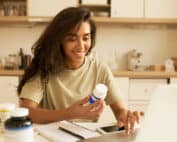Men’s Hormones Affects Libido, Strength, Ambition and Mood
Men’s hormones go through fluctuations at different stages of life. Just think of a teenage boy when testosterone is ramping up and their minds and bodies are not accustomed to their effects. The surges are erratic and can result in feelings of being powerful and confident and performing actions without carefully considering the consequences. Too much gives them acne and fast growth of facial hair and they become impulsive, aggressive and fertile with sexual desire.
As the body’s production levels off, there is a period of stability, strength, self esteem, control and well being. However, levels drop as men age and testosterone can be converted into other forms depending on the environment, diet. Body composition and exercise also affect testosterone levels as well as how it is processed in the body. Men are lured by ads for testosterone replacement and the only thing that most practitioners measure are the levels of testosterone. There is much more to it.
Symptoms of Low Testosterone or Andropause
Unlike women who have strong indicators such as hot flashes, night sweats and changes in their cycle, the symptoms of male menopause are slow and insidious. The most frequent complaints are:
- Loss of libido
- Erectile dysfunction
- Weight gain
- Decreased strength
- Decreased endurance
- Lack of competitive drive
- Loss of motivation
- Lack of self confidence
- Mood swings
- Anxiety
- Irritability
- Depression
- Sleep disturbance
- Loss of vitality
- Poor memory
A big mistake is to assume this is normal or only due to aging or low testosterone. The onset of these symptoms is usually slow and gradual. There are many factors that contribute to these symptoms and all must be taken into account to achieve the best result. You can regain your youthful energy, strength and vitality as well as achieve many other health benefits safely.
Hormone Replacement Enhances Health
Testosterone in men is like estrogen in women. The effects go way beyond reproducing offspring and sex. You have receptors in many organs and tissues to maintain health and vitality. The following are some effects of optimum levels:
- Enhance self confidence
- Boost self esteem
- Improve mood and sleep
- Feeling a sense of well being
- Muscle strength
- Maximize endurance
- Build bone strength
- Increase lean muscle mass
- Enhance libido and erections
- Increase energy and vitality
A big mistake is to attribute all of the symptoms and expect improvement by just giving testosterone. It is important to measure the other hormones and metabolites or how your body processes testosterone and monitor side effects.
Testosterone is bound to protein
Testosterone does not travel freely through the blood. It is fat soluble and must be bound to a protein called Sex Hormone Binding Globulin (SHBG). The more SHBG you have holding onto testosterone, the less is available to your tissues. The true measure of what is available to tissues is measuring the free testosterone.
- Only free testosterone is biologically active and can enter the cell and activate the receptor.
- The production of SHBG affects the ability of testosterone to exert its effects
- Estrogen and thyroid hormone increases SHBG production and decreases free testosterone
- Androgens and growth hormone lower SHBG and increases free testosterone.
- Liver disorders can increase SHBG and lower testosterone.
- Injectable, synthetic testosterone may increase liver inflammation and increase SHBG more than the topical bioidentical form.
To properly dose testosterone, it is important to be aware of all of the factors that influence its effects. The type and way it is delivered either through the skin or by injection can influence its effects and side effects.
Hormones are converted to other hormones
Enzymes in the body convert testosterone into a very strong testosterone called dihydrotestosterone (DHT) and to estrogen. Each person is unique regarding how much they convert and their nutritional status; diet, exercise and weight can influences the conversion.
Too much estrogen can cause weight gain, enlarged breasts, listlessness, depression and elevated SHBG making testosterone less available to have it’s effects. This can be the result of environmental estrogens found in plastics, herbicides and pesticides and hormones in meat as well as zinc deficiency and abdominal fat. Conversion of testosterone to estrogen occurs in visceral fat. So to keep your testosterone elevated and your estrogen low:
- Lose weight
- Decrease environmental estrogens
- Replenish nutrient deficiencies like zinc
- Build muscle by heavy weight lifting
Many men convert testosterone to DHT and this can cause hair loss. It was also thought that it increased the size of the prostate gland and led to cancer, however the latest studies indicate that it only causes hair loss. The biggest mistake is to keep giving testosterone when the free levels are low. Often times it is converted to DHT and can cause aggressiveness, hair loss and mood swings. Studies showed early development of hair loss was associated with double the risk of developing prostate cancer. Supplementing with herbs such as saw palmetto and stinging nettles or a medication finasteride (Proscar or Propecia) can decrease the conversion to DHT and slow hair loss.
Is it Safe?
To date, there have not been any studies that link testosterone to the development of cancer. Doctors avoid giving it to anyone with active cancer because of the fear that it may accelerate cancer cell growth.
Any substance can be abused, therefore careful monitoring of symptoms and side effects such as increased red blood cell count, elevated liver enzymes, an accelerated rise in prostate specific antigen (PSA), hair loss and levels of total and free testosterone, SHBG, DHT and the other hormones that influence levels is the key to safety. You can get superior results when you address lifestyle issues such as diet, exercise, supplements, and sleep as well as avoiding environmental toxins.
Harmonize your hormones with lifestyle ad when all else fails, seek the advice of an anti aging, functional medicine expert to help you balance your hormones with bioidentical testosterone. Seek out someone who will take into account your diet and unique genetic and metabolic makeup for personalized, customized care.






She is a recognized and award-winning holistic, functional, integrative and anti-aging healthcare practitioner, speaker and author, and has been featured in ABC News, Forbes, WOR Radio and many media outlets to spread the word that you can live younger and healthier at any age.